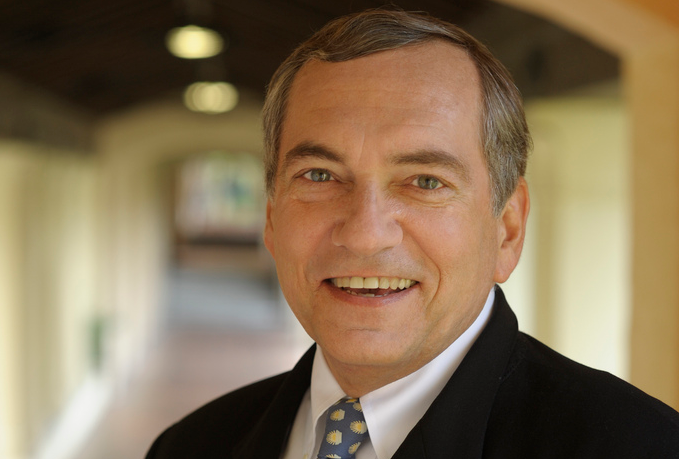[information]This opinion piece comments on a series of articles commenting on the Arts and Sciences faculty at Rollins College voting no confidence in current college president Lewis Duncan. Initial coverage begins here. [/information]
As a loyal friend of the faculty, Davis defends the no confidence resolution and discontent with President Duncan.
In his recent response in The Sandspur to a recent article in The Orlando Sentinel, President Duncan admirably puts into historical and bureaucratic context the recent vote of no confidence by the A&S faculty of Rollins College, which took place after the administration decided to restore the business major at Rollins. As a 1982 graduate of Rollins with many friends among the faculty and administration over the past 30 years, I am keenly interested in this issue. As at all colleges, a certain amount of tension between professors and administrators is inevitable. The president and trustees must make difficult decisions for the long-term good of the college that sometimes run afoul of faculty and student opinion. Still, the bottom line is that he received a vote of no confidence by a vote of 67-10. It was neither a close nor contentious vote, and it reflects dissatisfaction with the president that has been brewing for years.
My professor friends have complained for some time that he has no respect for them, rides roughshod over them, and holds their academic abilities in contempt and has said so openly. While Presidents Thaddeus Seymour and Rita Bornstein faced more than their fair share of grumbling and dismay among faculty members, none of them ever said they felt Thad or Rita loathed them or denigrated their professional abilities. These expressions are not coming from among the old guard nearing retirement, which one might dismiss as jealous carping over the loss of power or mere fear of change. I have been hearing the frustration of the younger professors in their 30s and 40s, the backbone of the college, who care deeply about providing superior education to the students and have tied their personal and professional fortunes to the college. Most of them are little interested in internal politics or venal benefits for themselves. The problem here is not only procedural; it is attitudinal and reveals a crisis of leadership.
The decision, briefly mentioned in the Orlando Sentinel article, to censure Dr. Duncan after the administration created a new College of Professional Studies two years ago, was an opening salvo in what seems to be a deepening war. While some faculty may have been represented in the discussions to create the new college, a large number opposed this change and some felt it was a precipitous decision. While it’s well and good to say that faculty are given adequate ability to participate in the college decision-making process, as President Duncan maintains, administrators also have ways of “including” representatives in ways that neutralize them, either by relying on representatives overly-friendly to the powers that be or by overriding decisions by committees. I don’t know if that happened here, but the decision to censure Dr. Duncan (who is not only President of Rollins but a faculty member as well) reflects significant discontent from faculty members who supposedly enjoyed the benefits of full participation. Such a vote is not taken lightly. And what might have been an opportunity to have some frank dialogue seems to have been lost, as the president seems to have embraced estrangement rather than engagement with the faculty.
The decision to re-establish the business major happened very quickly and surprised the people I know. One professor told me that much of the impetus came from the Holt School to add to its course offerings, which could be a good thing for that school, but many faculty apparently feel that such an important decision was not well discussed or thought out. Ironically, while Dr. Duncan mentions President Seymour in his defense of his actions, one of Dr. Seymour’s signal achievements came in 1980, when the College reduced business from a major to a minor, strengthened the undergraduate economics department and began building the Crummer School MBA program into the innovative and well-regarded institution it is now. Indeed, in my opinion it was many of the business majors who fostered the “Jolly Rolly Colly” public image of Rollins as a second-rate party school for northern playboys and girls. That decision helped set Rollins on a 30-year course of academic improvement that continues today.
I don’t know what lies behind the decision to revive the business major, but I suspect it has much more to do with financial motives than academic ones. I also suspect it reflects an increasingly common attitude among administrators in the U.S. that college professors are little more than intellectual fast food workers providing credentialing services to student “consumers” without challenging them too much, rather than highly (and expensively) trained professionals sharing their expertise with students while pushing them hard to strengthen their minds and learn new skills. I hope that is not the case. I hope that the move to create a College of Professional Studies and add a business major reflects a sincere desire to update the College’s intellectual offerings for the electronic age and not a cynical attempt to attract affluent but mediocre students able to pay the high cost of private education. As an alum, I would not want to see the College abandon its commitment to academics.
There are many superb aspects to Rollins College. Its academic reputation nationwide has never been higher, and the new hotel and conference center is an exciting innovation President Duncan has worked for – but right now he’s a deeply unpopular captain of a surly and disheartened crew who feel utterly devalued and he needs to regain their trust, which can only happen through better communication.
In answer to a question from the Chronicle of Higher Education, however, Duncan does not seem to embrace the idea of working as a team with the College’s key employees: “Change is inevitable, that decisions and actions frequently must be undertaken more quickly than the deliberative pace at which faculty bodies are inclined to act, that change evokes resistance, and that broad consensus for change is often unrealizable.” One may wonder what the rush is in creating a new business major. And impatience with “the deliberative pace of faculty bodies” smells like the desire to rule by executive fiat.
The great thing about Rollins is that is small enough to foster a family atmosphere and for students, faculty, staff, and administration to engage in a partnership for the common good. That is often a contentious process, but with openness and good will Rollins can achieve a state of greater happiness and inclusion in the critical decisions that affect everyone. We shall see if such good will exists in the executive offices of Rollins College.











Be First to Comment